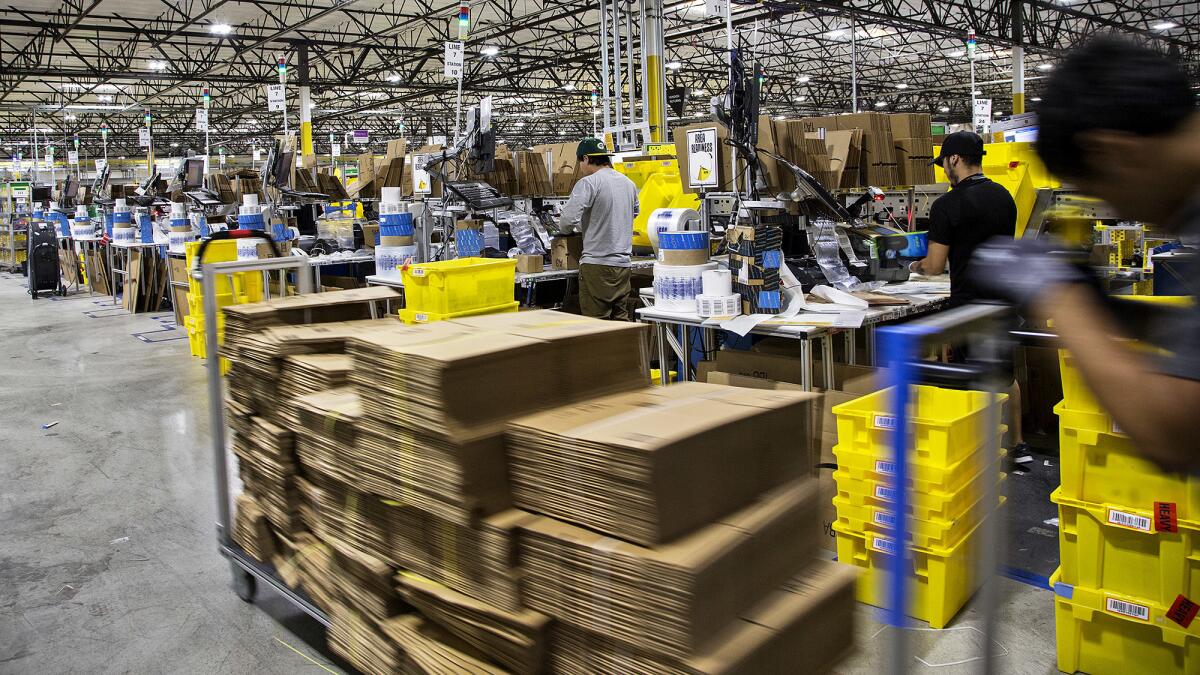Trump economy poses big risk and potential big reward for California

California is at the epicenter of some of the most fundamental changes Donald Trump has proposed for the national economy, in trade and immigration.
About 40% of all goods arriving in the United States by sea come through the state’s ports. And more than a quarter of all immigrants who are in the U.S. illegally live in California, many of them working in agriculture, hospitality and manufacturing.
So it shouldn’t be a surprise that the latest report from the UCLA Anderson Forecast found that Trump’s plans for the economy could deeply affect the health of the California economy, the sixth largest in the world, one way or the other.
At stake are up to 24,000 logistics jobs, 50% of the state’s agriculture jobs and an untold number of military manufacturing jobs, according to the report.
“We are going to see a paradigm change on these two issues, international trade and immigration, under President Trump,” says William Yu, an economist at UCLA who is a coauthor of the report.
“I am optimistic about the direction we are going to see,” he added. “We aren’t going to see some kind of disaster happening next year.”
Yu says he sees only about a 10% chance of a trade war with China or Mexico, partly because those countries “have much more to lose than the U.S. if a trade war happens.”
A more likely outcome is that Trump gets a better deal with China, Yu says, by using Taiwan as leverage to push China to stop manipulating its currency and reduce its tariffs on some U.S. imports, for example.
A new trade arrangement with China that boosts exports from the U.S. could lead to 10,000 new jobs in transportation and warehousing, and 14,000 new jobs in wholesale trade in Los Angeles County, the report calculated.
A trade policy that increases tariffs significantly on Chinese goods, on the other hand, could mean that California logistics businesses will need to cut the same number of jobs. It also might siphon off the flow of Chinese money into Los Angeles, the report said.
Our voracious appetite for Chinese goods has funneled money into Chinese hands, which comes back to California in the form of hefty spending on condos, movie studios and even carmakers. Axing imports from China might mean that investment dwindles in the future.
Trump has sent mixed messages on his immigration plans, saying both that he plans to deport all 11 million immigrants in the U.S. illegally and that he plans to focus on the ones with criminal records.
California’s farmers are probably rooting for moderation on that issue. About half of all agriculture workers in the state came here illegally, the Anderson report said.
Eliminating that chunk of the workforce would make vegetables and fruits more expensive, said Jerry Nickelsburg, another UCLA economist who co-wrote the report.
Those crops still need to be tended to by a lot of human hands. Farmers would have to give workers a raise, but they would probably still face a labor shortage and have to cut some of their output, reducing the supply of strawberries and artichokes, for example, and boosting prices for shoppers.
“In the short run you have less food produced in California, you have higher prices for that food,” Nickelsburg said.
The report suggests that the poorest workers who legally reside in Los Angeles county would have a better chance of keeping their jobs if an estimated 1 million workers in the county illegally were to leave.
Yu, the UCLA economist, assumes that businesses in the county will eventually cut jobs in response to a rising minimum wage in California, which will hit $15 an hour by 2022. Angelenos who are here legally would benefit from not having to compete with a large group of workers here illegally for a smaller pool of low-wage jobs.
Another potential bright spot for California: Trump’s promise to raise military spending. The state is a juggernaut in aerospace and defense manufacturing, thanks to plants in Southern California that produce hardware and companies in Silicon Valley that develop some of the technology behind sophisticated weaponry.
“We will get a disproportionate amount of that business,” Nickelsburg said.
Follow me @NatalieKitro on Twitter
ALSO
GOP to start Obamacare repeal Jan. 3 (but might not finish until 2019)
Trump wants the contract to develop a new Air Force One canceled, calling the program ‘ridiculous’
Son of incoming national security advisor fired from Trump transition team after promoting fake news
More to Read
Inside the business of entertainment
The Wide Shot brings you news, analysis and insights on everything from streaming wars to production — and what it all means for the future.
You may occasionally receive promotional content from the Los Angeles Times.









